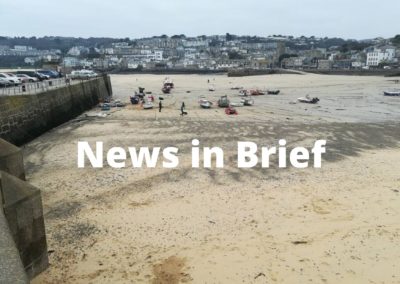Cornwall Council’s cabinet has given the go-ahead for the next stage of public consultation on the Climate Emergency Development Plan Document (DPD).

Photograph: Unsplash/Belinda Fewings
Despite part of the consultation taking place during lockdown, the council received detailed evidence, information, and suggestions from experts, residents, activists and interest groups.
Feedback will help shape its draft policies on measures to support Cornwall in becoming carbon neutral by 2030, and will be published shortly. The next stage of public consultation runs from 10th August to 25th September.
Edwina Hannaford, Cornwall’s cabinet member for climate change and neighbourhoods, said: “There have been challenges because of Covid-19, but the depth of feeling raised by the climate emergency and the fears that were shared in responses have rightfully kept our environment at the top of the agenda.
“Cornwall’s aim to become carbon neutral by 2030 needs a range of measures across the council and amongst our communities and businesses. My colleagues in planning have an important role to play in setting planning policies to help us reach our goal. We will lead by example, but will need other agencies, businesses, residents, and visitors to help Cornwall take this step.”
Climate Emergency DPD policies are being considered to support:
Green energy: This could mean allocating areas for renewable energy, safeguarding renewable energy sources, and promoting energy storage solutions to ensure renewable power generated in Cornwall can be used here.
Enhancing the environment: Using nature to reduce Cornwall’s carbon footprint, protecting and increasing biodiversity, and planting more trees and hedges, for example through the 8,000-hectare Forest for Cornwall programme.
More efficient housing: Building homes with alternative, renewable energy sources, improving building standards, and retrofitting Cornwall Council housing to make homes warmer and greener.
Greener travel: Looking at ways to reduce the need to travel by designing places that encourage walking and cycling.
Community resilience: Increasing resilience to coastal change and flooding, making sure buildings are in safe locations, and creating natural flood management systems.
Like the Local Plan, the Climate Emergency DPD would become a statutory planning document, supporting and strengthening the policies that have already been adopted to protect the environment. All suggestions and feedback received during the consultation will be considered but not all ideas can be included in planning policy.
After 25th September, there will be more chances to comment on the Climate Emergency DPD, on further consultation dates to be announced, before final policies are decided and submitted to government for inspection in 2021. It will then become a legal planning document, like the Local Plan, and will support and strengthen policies that protect the environment.
If you would like to be added to the DPD mailing list, email climatechangedpd@cornwall.gov.uk



